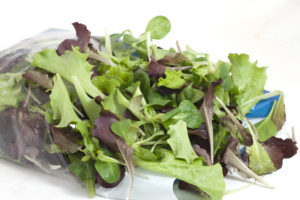
But you can always lower your risk of infection.
As of this writing, the outbreak of cyclosporiasis has affected 200 people in eight midwestern states. Symptoms affecting the gut arise about seven days after consumption.
Bagged salads are no stranger to contamination. Sometimes it comes from the water used to irrigate the vegetables, while other times, it can be bacteria or parasites that attach to the product. In any event, this means you should always wash your food.
Avoid buying salads that say they are pre-washed, and even if they are, wash them. Or you could go one step further and avoid these products altogether. Instead, opt for fresh vegetables that you can wash before eating.
The vegetables in bagged salad like lettuce, radish, and carrots are handled multiple times and have the potential for all kinds of parasitic exposure. On the other hand, by peeling the outer layers of fresh vegetables, you can easily avoid potentially harmful bacteria.
Just be sure to clean your veggies before cutting/peeling.
Storage is also essential. Bacteria can form on vegetables at room temperature. Keeping items refrigerated before use can cut down the risk of contamination, and eating them shortly after preparation is a wise idea.
Promptly package the leftover salad in an air-tight container and refrigerate when your meal is finished. To avoid soggy leaves, don’t dress the entire salad. Use a bit of dressing to cover the serving on your plate and save the rest for when you need it.
So, if you’re eating better to lower blood pressure, cholesterol, and lead a healthier life, consider your gut health. Choose fresh options where you can monitor cleaning and preparation to reduce your risk of a parasitic bacterial infection.




